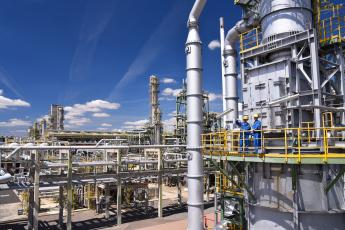This article originally appeared on Politico.
The idea of an environmentalist working in the refining and petrochemical industries seems like the ultimate paradox to some. But scientists and environmentally minded experts within these sectors are emerging as some of the most effective and powerful champions of sustainability, spearheading efforts and innovations both internally and externally to help protect the environment.
From leading ecological restoration projects to driving influential new sustainability programs, purpose-driven employees are informing more environment-friendly policies and processes, guiding decisions and enacting long-term change from within fuel and petrochemical companies.
“The fact that environmentally minded people are going into the industry is not new. What I think is becoming more and more prevalent is that they speak out — they are making it part of their work conversations and their work expectations,” said Julia Wellner, an associate professor of earth and atmospheric sciences at the University of Houston, who has been vocal in her view that more students with environmental interests and training should consider careers in the oil industry.
“I think we want people in the industry that are aware of the impact that they are making. Some of our impacts in any [oil and gas] job are great — we are providing energy,” she continued. “At the same time, we want to be aware of our negative impacts.”

Valero employees host clean up days for their communities and surrounding areas.
U.S. refiners and petrochemical manufacturers have always employed individuals with disparate experiences and expertise. Workers with backgrounds in environmental science, biology, public health and similar fields regularly work alongside engineers, operators and safety professionals. But increasing public attention in recent years to issues like climate change, mismanaged plastic waste in the environment and industrial emissions has elevated the voices of a subset of environmental activists who are calling for a complete dismantling of the oil industry — dissuading some jobseekers from pursuing positions at refining and petrochemical plants.
And yet, others who also identify as fervent environmentalists are taking a starkly different approach: seeking out careers in the refining and petrochemical sectors to advance positive outcomes and encourage change from within.
“These individuals, many of them Gen Z and millennials, offer such vital perspectives,” said Adam Ali, manager of workforce development at the American Fuel & Petrochemical Manufacturers (AFPM) trade association. “They understand that our products change people’s lives for the better and make technologies like low-carbon fuels, wind turbines and flexible solar panels possible. They are also passionate about seeing that natural resources are handled responsibly and that operations are safer. They are pushing companies to continue improving on what it means to operate in an environmentally responsible way.”
Today’s environmentalists who are working at fuel and petrochemical companies not only have access to unique resources and colleagues who are at the forefront of energy innovation; they also have a first-hand look at how their organizations are managing important issues.
“Our members are committed to doing their part to address climate change and environmental challenges, including through research, development and investments to scale new products and technologies,” said Chet Thompson, president and CEO of AFPM, who cited an analysis by Harvard Business School last year showing that oil, gas and energy production firms are among the highest producers of green patents, which are patents on products that provide environmental benefit. A Harvard writer described these companies as “some of the most prolific and influential producers of green innovation.”
“Considering the environmental and social issues our world is facing, we need a diversity of voices contributing to an inclusive conversation on how to best build a sustainable future,” said Thompson, who credits his decades practicing environmental law as a guidepost for developing sustainability initiatives within the industry.
Below is a look at how three environmentalists — Alyssa Navarrete, Bill Goulet and Ashley Guerrediaga — are not only contributing to the conversation on sustainability, but are driving environmental efforts at U.S. refining and petrochemical companies.
An environmental biologist trailblazing conservation programming
Equipped with a bachelor’s degree in environmental biology and a master’s degree in business, Alyssa Navarrete entered the refining workforce with a vision to improve the environment in a meaningful and significant way.
“Typically, someone with my background would go into lab research or field ecology, but I saw a lot of potential at Valero,” said Navarrete, who supports ecological and biodiversity initiatives at the company’s refineries and ethanol plants.
With the understanding that plant operations can affect natural habitats, Valero’s biodiversity efforts help preserve, protect and nurture critical ecosystems and local species that depend on them. Navarrete works closely with Valero’s environmental team, as well as her public affairs and community affairs colleagues, to assess, design and implement conservation programming throughout the company’s fleet of refineries.
Navarrete’s work with local environmental teams includes a variety of projects from collaborating with local nonprofits to create a monarch butterfly habitat at Valero’s Ardmore Refinery to installing nest boxes for the endangered peregrine falcons at Valero’s Jefferson, Wisconsin, ethanol plant to working on a partnership with the Texas Coastal Exchange, to capture 10,000 tons of carbon dioxide in marsh, prairie and woodland habitat along the Texas Gulf Coast wetlands. Navarrete’s support is helping to discover new and innovative ways to safeguard these fragile areas, including wetlands and marshes, now and for the future.
For Navarrete, like many Gen Z students passionate about the environment, the thought of looking for a job in the refining industry was not initially obvious.

Navarrete (at Valero’s headquarters in San Antonio) is one of many Gen Z industry employees driving sustainability in the refining and petrochemical industries.
“I think some people have negative ideas about oil and gas companies without really knowing a lot about the environmental projects they have going on,” said Navarrete. “I worked biologists and ecologists in my undergrad, and I think at first when they first learned where I was working after graduation they were shocked. But I went to school with the idea that I wanted to protect the environment in my career, and I’m really excited to think about the potential, sustainable impacts of my work.”
For Valero, hiring Navarrete — their first biologist to work in this capacity — underscores the company’s strategy as it continues to advance low-carbon initiatives, ecological and biodiversity efforts.
“Alyssa is dedicated to the coordination and expansion of ecological and biodiversity good practices and efforts that may be occurring at one of our plants and replicating them throughout the entire fleet of refineries and ethanol plants. She has been a great addition to the team.” Rob Martin, Vice President, Environmental, Compliance and Remediation.
Navarrete is both hopeful and optimistic about her role and the change it will bring.
“I have learned so much in the last 18 months and I feel like I have barely scratched the surface,” she said. “I am really proud of the work that I am doing.”
A nature photographer aiding a wetland’s transformation
Bill Goulet is a principal environmental engineer and wildlife photographer who has worked at Westlake Chemical for 42 years, the last 17 being in environmental remediation, which includes managing substantial wetland restoration efforts in Louisiana.
When a century of subsidence and industrialization on the banks of Bayou d’Inde impacted its diverse ecosystem, Westlake, led by Goulet, facilitated a joint remediation and wetland restoration project. The company worked with diverse teams, such as dredgers and wetland planters, and coordinated with agencies including the U.S. Environmental Protection Agency (EPA), the Louisiana Department of Environmental Quality, and the U.S. Fish and Wildlife Service to restore the habitat.
After placing 1.8 billion pounds of new soil to reach a sediment elevation so plants could thrive, Goulet and his project partners transplanted 120,000 native cordgrass plants to the new wetland by hand, on foot and by airboat.
“Because the area is so visible on both sides of Interstate 210, people saw the progress,” said Goulet. “It shows that we can restore these wetlands. It demonstrates that it can be done.”
“It is important for oil and gas and petrochemical companies to be good stewards of the environment,” he added.
Goulet used his personal passion, wildlife photography, to document and bring attention to the environmental improvements.
Featuring 175 acres of restored wetland, Goulet’s images, including aerial video taken by drone, capture phases and progress of the habitat restoration process. They now stand as a bold, visual testament to the value in caring for natural habitats.
Goulet is putting his passion for photography to use, tracking the progress of wetland restoration in Louisiana.
“If you want to make the most impact and protect the environment, why would you not work for an oil, gas or a petrochemical plant?” said Goulet. “That is where the most good can, and is, being done. That is where you want the experts.”
A geologist spearheading a first-ever environment committee
Ashley Guerrediaga’s day job at Houston-based CITGO is to ensure that refining facilities comply with regulations. But she has taken her commitment to advancing sustainability a step further by founding the company’s first environmental stewardship committee.
A recent University of Houston graduate and a geologist, Guerrediaga established the committee after noticing simple, yet actionable steps the corporate office could take to support sustainability practices. Since then, she has helped develop and introduce recycling and waste management programs within the company.
“It is our responsibility as humanity to care and to take care, but especially being a petroleum company, our responsibility doubles,” said Guerrediaga. “We need to put our individual interests aside for the good of our home, ourselves and generations to come.”

Guerrediaga is championing sustainability at CITGO as the founder of the company’s first environmental stewardship committee.
Through Guerrediaga’s dedication, the committee has expanded to 40 people in just over a year. The team has introduced training courses on waste management that are applicable to employees at home or at work. Their efforts are advancing a company culture of keen environmental awareness, starting at the individual employee level.
“She was concerned about leading this, being so young, but I think that also is one of her strengths,” said Melissa Edge, Guerrediaga’s manager and light oils compliance manager at CITGO.
Edge said that Guerrediaga’s sense of urgency to take more serious and substantial environmental action is shared amongst the CITGO community.
“Bringing that environmental sustainability back into the focus is a critical component of everything that CITGO does,” Edge said. “Companies need to have that commitment to improving the environment, whether it is locally or globally.”



